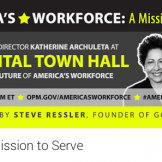Watch America’s Workforce: A Mission to Serve
Did you know that 85 percent of the Federal workforce is based outside of the D.C. region? OPM Director Katherine Archuleta does. In her first year as Director, she’s traveled the country, meeting with federal employees all across the country. And this Friday, she’s going to celebrate her one-year anniversary as Director of the U.S. Office of PersonnelRead… Read more »



